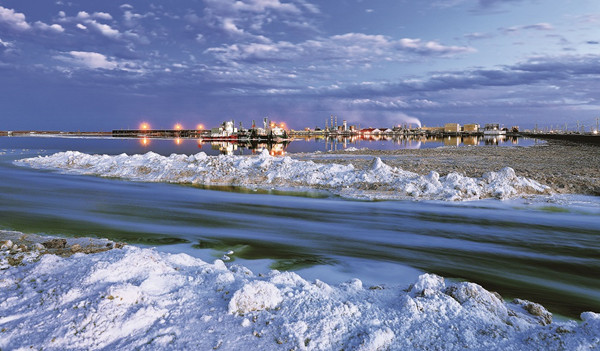Qinghai grasps ecological advantages

The Qarhan Salt Lake in the Qaidam Basin in Qinghai province. The biggest salt lake in Asia, it is also the site of China's biggest potash fertilizer manufacturer. CHINA DAILY
Northwest China's Qinghai province will continue to pursue the road that prioritizes high-quality development through its ecological advantages over the next five years as China embarks on its new journey toward socialist modernization.
As part of the province's 14th Five-Year Plan (2021-25) for national economic and social development, as well as its long-term goals for 2035 that were released in February, "green" has been highlighted as a key word.
The province, with a population of 5.92 million people, is rich in natural resources thanks to its plateau location and over 3,000 hours of daylight every year. It has attracted a number of wind power plants and photovoltaic companies.
Due to its unique advantages in developing clean energy, Qinghai has more than 100,000 square kilometers of desertified land that can be used for the construction of photovoltaic power stations and wind farms.
Moreover, as the source of China's three major rivers-the Yellow, the Yangtze and the Lancang-Qinghai has strong potential to develop clean energy and build more hydro facilities.
Its unique geographical advantages have helped Qinghai make rapid progress in the development of clean energy in recent years.
Total installed power capacity in Qinghai was 40.3 million kilowatts by the end of last year, more than 90 percent of which was produced by clean energy, according to the State-owned Assets Supervision and Administration Commission of the State Council.
Just over 24 million kW were from solar, wind and biomass power, and 11.9 million kW were produced by water. With an installed capacity of 15.8 million kW, photovoltaic power generation exceeded that sourced from hydropower, becoming the largest electricity source in Qinghai.
Power output generated by clean energy in Qinghai last year totaled 84.7 billion kWh, equaling that produced by burning 38.1 million metric tons of coal. The use of clean energy meant the elimination of 62.7 million tons of carbon dioxide.
In the province's 14th Five-Year Plan released recently, ecological civilization-a concept promoted by President Xi Jinping that advocates balanced and sustainable development-has been prioritized.
The long-term plan aims to build a complete industrial chain for green businesses and establish the province as a firm pillar for the country's biological safety. It also announced it would take the lead in the country to achieve its carbon dioxide emissions peak by 2035.
Qinghai has pointed out that it will build a national clean energy demonstration province, developing photovoltaic, wind, solar thermal, geothermal and other new energy.
As Qinghai bears great responsibility for ensuring the country's ecological security and the sustainable development of the nation, the plan said the province must undertake the important missions of maintaining ecological security and protecting both the three-river-source area, known as Sanjiangyuan, and Qinghai's status as "the water tower of China".
Within the next five years, the plan revealed that more efforts will be made to increase public awareness of environmental protection and to promote the concept of a green lifestyle among the general public.
According to the plan, the province also aims to build itself into a model of environmental protection with the construction of national parks, the development of clean energy and the promotion of organic agriculture products.
"Our blueprint over the next five years and for 2035 is to roll out measures encouraging people in Qinghai to become further involved in the province's development with a greater determination and stronger confidence," said Wang Jianjun, Party secretary of Qinghai, during the sixth session of the 13th Qinghai People's Congress earlier this year.
He said Qinghai is an important warehouse of natural resources in the country, and it plays a vital role in the development of the nation's green industry.
"With such profound potential in the green industry, Qinghai needs to make better use of its natural resources and promote energy-saving equipment manufacturing," Wang said.
As this year marks the centenary of the establishment of the Communist Party of China and also the first year of the 14th Five-Year Plan, Wang said the governance of both the Party and the province should make sure this year goes smoothly.
Highlighting a Party-wide campaign to promote education about CPC history, Wang said one of the campaign goals is to reinforce all Party members' ideals and convictions and to ensure that they remain true to their revolutionary spirit.
He noted that all Party members should shoulder their responsibility and play their leading roles, especially when there are challenges and difficulties.
"We should always bear our responsibilities and keep our development aims in mind, exhibiting the Red spirit endowed by members over the decades with persistence and resilience," he said. "We should serve the people wholeheartedly and always promote the innovative spirit."
At a recent conference on encouraging people to learn Party history, Wang said history is the best textbook, and it shows that the easiest way to capture a fortress is from within it. Over the past century, the CPC has been constantly maintaining its forward-thinking nature and guarding its purity against corruption or disintegration.
Studying Party history will make this even clearer to CPC members and help maintain the strict self-governance of the Party, Wang said.

